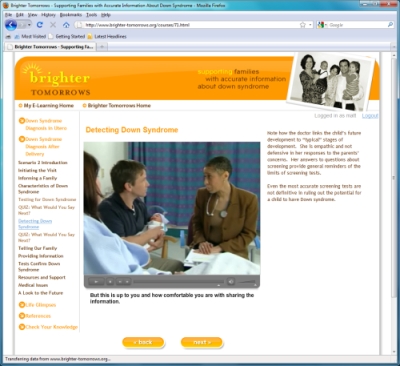News from the Human Development Institute - University of Kentucky: Brighter Tomorrows RTOI and Preservice Health Training Modules Updates Brighter Tomorrows
October 12, 2009

|
| Screenshot from Brighter Tomorrows website |
During the last four years, AUCD and the NCBDDD of the CDC supported the development of Brighter-Tomorrows, an evidence-based program designed to train physicians in delivering diagnoses of Down syndrome in utero and postnatally (RTOI 2003-01-13 and RTOI 2007-03-01). The University of Kentucky Human Development Institute and members of a medical and expert parent team created this Web-based, cost-free program and have completed a national study of its effectiveness using participants from 16 residency programs nationally. Full results of this study are reported in the September issue of American Journal of Obstetrics and Gynecology (Kleinert HL, Lunney CA, Campbell L, & Ferguson JE. Improving residents' understanding of issues, comfort levels, and patient needs regarding screening for and diagnosing Down syndrome. Am J Obstet Gynecol 2009;201:328.e1-6). Results indicated significant gains in knowledge and perceived comfort level for both pediatric and OB/GYN residents who participated in the study.
For the physicians' version, www.brighter-tomorrows.org, users can log-in with their own self-designed ID and password that will allow them to "bookmark" their place in the tutorial, for return at a later time. The physicians' version also includes a "Refresher" section addressed to specific topics that practicing physicians will find useful. In addition, the family version, www.brightertomorrows.org (no hyphen), is available in both English and Spanish and has had almost 3,000 hits from 60 different countries. Physicians and other medical providers may want to use this site for family education in their medical practice, and families can access this site directly.
Preservice Health Training Project Update:
HDI has recently created updated web-based versions of the Preservice Health Training tutorials, which are part of the AUCD Medical Tool Kit on teaching medical, dental, nursing, and physician students about the needs of children and adults with developmental disabilities. These are: the Women's Health Training Module (http://womenshealth.phtmodules.net) which includes a virtual patient case of a young woman with intellectual disabilities scheduled for a gynecological exam; Dental Students Modules (http://dental.phtmodules.net) including a pediatric virtual patient with Down syndrome and an adult patient with deaf-blindness; and the Nurse Practitioners Modules (http://np.phtmodules.net), and Physician Assistants Modules (http://pa.phtmodules.net), both of which include the virtual patient cases of an infant born with extreme pre-maturity and a well-adolescent check-up for a young lady with Down syndrome. Each is a multi-media, interactive program that includes written information points, Flash-based videos modeling professional treatment situations, quizzes that ask professionals to test their knowledge, and printable certificates for performance above 70% on the quizzes. Users are asked to open the tutorial with a self-designed log-in and password so that they can re-access the module at their place of departure. All four of these tutorials can be operated with a variety of Browsers (Explorer 7, Google Chrome, Firefox, etc). Each of these modules has undergone peer-reviewed, published effectiveness studies illustrating their impact upon both knowledge and attitudes of future health care providers. Funding for the Preservice Health Training Modules was provided by the Kentucky Council on Developmental Disabilities.
Questions should be addressed to Harold Kleinert, [email protected].







